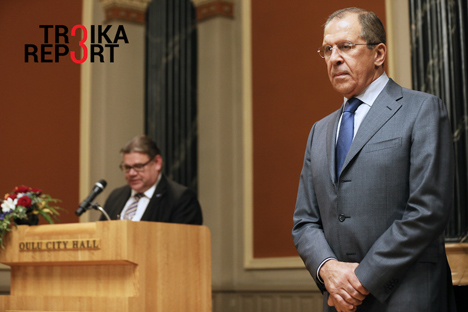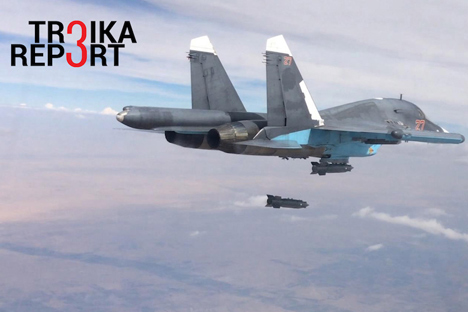Russia’s chance to forge pan-European unity, at least in the Arctic

Russia's foreign minister Sergei Lavrov and Finland's foreign minister Timo Soini at a ceremony at Oulu townhall to mark the hand-over of the Barents Euro-Arctic Council chairmanship from Finland to Russia, Oct. 14.
Alexander Shcherbak/TASSThis week Russia has assumed the rotating chairmanship of the Barents Euro-Arctic Council (BEAC), a development that passed almost unnoticed by mainstream Western media. Yet this is probably one of the few international discussion platforms involving Russia that has not recently been scrapped or frozen.
Moreover, Russia’s chairmanship may have the potential to help improve relations between the body’s Western member states and Russia, given the Council’s track record of modest yet convincing compromises achieved through negotiation rather than unilateral actions on the ground.
Created in 1993 — ironically through the efforts of a Norwegian, the father of Jens Stoltenberg, the incumbent secretary general of NATO — the BEAC was designed to bring the two sides of Europe under one umbrella.
Today, it has the potential to be a technical tool of cooperation because Northern Europe and the Arctic face mostly not ideological but technical issues. Russian Foreign Minister Sergei Lavrov was correct to point out the areas of interaction, which are of a very practical nature: making transport corridors, building infrastructure, exploiting the capabilities of the Glonass Space Navigation System, etc.
The Council embraces members with a special national interest in avoiding the politicization of issues related to the Arctic zone, i.e. Denmark, Finland, Iceland, Norway, Russia, Sweden, as well as the European Commission. The Council continues to serve its original purpose, spelled out as follows: use close cooperation to “secure political long-term stability and reduce possible tensions.”
Remarkably enough, this solemn objective, as postulated on the BEAC’s official website, “has already been successfully achieved. The Barents cooperation has fostered a new sense of unity and closer contact among the people of the region which is an excellent basis for further progress.”
Although the assumption that there is “a new sense of unity” can be disputed, there is hardly any doubt that the BEAC is less prone to a clash of incompatible opinions. Troika Report approached Fyodor Shelov-Kovedyayev, an academic and former First Deputy Foreign Minister of Russia, with the question: What is the importance of this low-key, almost “niche” organization?
“This institution has been set up by several states and the European Union with the goal of cultivating the cooperative interaction of those nations which have direct access to and place high stakes on developing the potential of the Arctic zone. The BEAC is an instrument for regulating activities in this region. Frankly, the Arctic nations are not too eager to let ‘outsiders’ into their area.
“The priority is to maintain a certain balance of power. If any ‘outsider’ is to be admitted to the club, they should be processed in an orderly fashion, and with the consent of all parties concerned.
“At the time the council was set up, there were several challenges, like the demarcation of the shelf zones and of the maritime boundaries. Most of the issues, with the exception of drawing the shelf frontiers, have been resolved.”
— In what way has the BEAC evolved with time? In 1993 dialogue between Russia and the West still resembled a prolonged honeymoon, unlike today when relations are depressed by the war of sanctions. How have the changing geopolitical realities affected the functioning of the BEAC?
“It’s an effective tool which serves its purpose. It could be put on record that this institution is not prone to volatility due to either headwinds or tailwinds. Here pragmatism rules supreme, and the West does not see any expediency in alienating Russia completely. It is no big secret that despite all the differences over Ukraine and Syria, interaction has not ceased.
“The United States and Russia are continuing to closely cooperate in the hi-tech field, e.g. we are sending American astronauts to the international space station; America buys from Russia valuable metal, titanium, which is essential to build aircraft, and also buys Russian-made engines to propel its missiles to send scientific and telecommunication satellites into orbit, etc. In fact, cooperation with the West has not been turned off altogether.”
This is all the more true of cooperation regarding the Arctic, with its susceptibility to human activity, which poses a danger of tilting the delicate ecological equilibrium in the region. To prevent damage to the environment, conventions on safety precautions and measures against oil spills and similar technological man-made catastrophes have been passed and are observed by Council member states.
This is no big deal but in the circumstances of the current systematic lack of understanding between the West and Russia the Barents Euro-Arctic is an encouraging beacon pointing in the direction of proper cooperation between nations. Hopefully, Russia’s chairmanship will be able to have a positive effect on the fabrics of international relations, at least in the European context.
All rights reserved by Rossiyskaya Gazeta.
Subscribe
to our newsletter!
Get the week's best stories straight to your inbox
